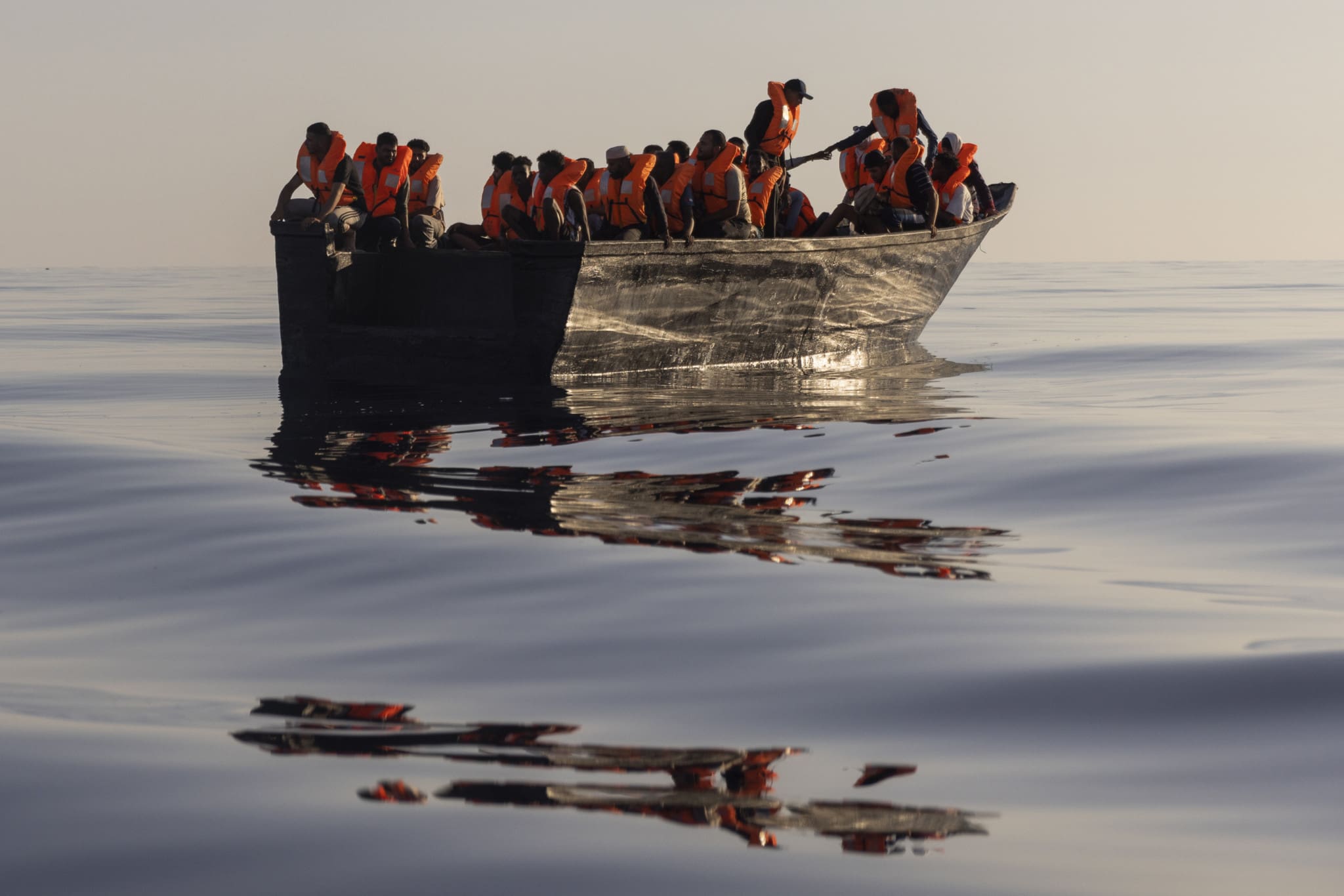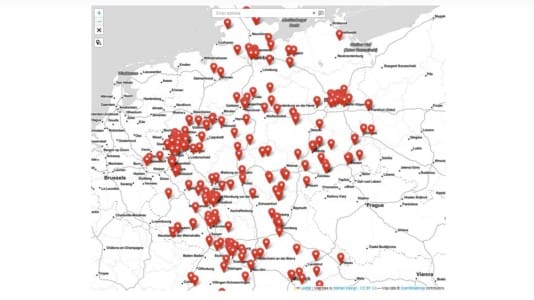Prime Minister Giorgia Meloni’s track record on illegal immigration does not look very good. For the first quarter of this year, the number of arrivals by sea, at over 27,000, is now four times what it was a year ago. Meanwhile, a new survey published by Quarta Repubblica sounds like a warning call to the governing right-wing coalition: 58 percent of Italians are against welcoming illegal immigrants and only 34 percent are in favor of Italy and Europe’s usual open-door policy; and the proportion of voters opposed to this welcoming policy rises to 92 percent among those who voted for Meloni’s Brothers of Italy, 94 percent among the League’s voters, and 81 percent among those who voted for Berlusconi’s center-right Forza Italia. Those are the three main parties making up Meloni’s governing coalition.
With well over 2,000 migrants in an overcrowded hot spot designed for just a few hundred people, the small island of Lampedusa, lying halfway between Tunisia and Sicily, has not yet witnessed any improvement since the change of government. This is despite the new rules on NGO ships enacted by the new governing majority, which forces them to immediately head for the port allocated by Italian authorities after a first rescue operation instead of staying near the Libyan coast to collect further loads of migrants until they reach or exceed their full capacity.
To alleviate the situation in Lampedusa, Sicily, and southern Italy, the authorities now direct some of the NGO ships to ports situated in northern Italy as well. It is something NGOs have denounced as a way to dampen their search and rescue work, thereby causing more deaths by drowning. The Italian government is “shamefully criminalizing those who step forward to assist refugees and migrants and obstructing the rescue work of NGOs in the Mediterranean,” said Amnesty International’s secretary-general, France’s Agnès Callamard, in an interview with “La Repubblica” published on March 28.
However, the accusation is highly questionable in light of a Frontex confidential report for the year 2021 that was viewed by the Adnkronos news site. In that report, the EU’s border agency describes how the presence of NGO ships off Libyan shores acts as a pull factor, with many migrants refusing to embark when those ships are not there waiting for them. In other words, it is the very presence there of European NGO ships that incite those willing to emigrate to Europe to sail off on small boats that are unfit for sea navigation and do not even have enough fuel for the journey to Europe.
It should also be noted in passing that while it is hardly ever criticized by NGOs and EU governments, the island of Malta has only admitted one such illegal immigrant since the beginning of the year.
“In fact, Valletta has contracted out to Italy the rescue of boats even in its own waters, getting rid of the migrant problem, which it has dumped on Italy, particularly on neighboring Lampedusa,” Il Giornale wrote on March 29. “NGO ships know the situation well. Their alerts are systematically ignored by the Maltese authorities. Malta washes its hands of them, so the problem falls on the Italian Coast Guard forced to handle thousands of arrivals. Malta may sometimes intervene, but not to rescue boats laden with migrants, just to repel them.”
However, it is now Tunisia, and not Libya, that is the main point of departure for migrants heading for Italy. From the beginning of January to mid-March, there had been over 12,000 arrivals from Tunisia and 7,000 from Libya. And the migrants who sail between Tunisia and the Pelagie Islands (where Lampedusa lies) usually do so on small fishing boats without the help of NGOs.
Tunisia’s Coast Guard units recovered 10,200 migrants bound for Italy from the beginning of 2023 to March 20, according to that country’s National Guard’s spokesman Houssem Eddine Jebabli, as quoted by Italy’s Agenzia Nova. Jebabli also pointed out that the flow of migrants is constantly on the rise. In 2022, he said 38,720 people were caught trying to sail to Italy, 80 percent of them being apprehended at sea during rescue operations. Some of the human traffickers are of sub-Saharan origin, and this is happening even though the crime of trafficking human beings can carry a sentence of up to 10 years in prison, Jebabli recalled.
Among those apprehended on March 24 on their journey to Italy was a Tunisian Islamic extremist who was sentenced in the past to 10 years in prison for “membership of a terrorist organization” by the Tunis appeals court, Jebabli also said.
The flow of sub-Saharan immigrants, in particular, has shot up since the beginning of the clamp-down on illegal immigrants in Tunisia ordered by that country’s president, Kais Saied, after he complained that “migration is a plot to change Tunisia’s demographics” and criticized “those who are behind this phenomenon,” who, he said, “are trafficking in human beings while claiming to defend human rights.” Since then, the Tunisian authorities have been sending groups of illegal immigrants back to their home countries, inciting others to speed up their departure to Europe when offered the possibility.
The people smugglers themselves have redoubled their efforts, even offering free passage to pregnant women and children as their presence at sea increases the chances to be rescued and disembarked at an Italian port.
In the meantime, the Meloni government has not yet been able to solve the problem of countries of origin refusing to take back their nationals, with deportation rates remaining hopelessly low as in the rest of the EU. Hence, Meloni’s recent discussions in Brussels for a common EU response involving increased pressure on countries of origin to take back their citizens and better surveillance of the EU’s external borders. Those discussions have been to no effect as of now, however, and one sticking point remains — Italy’s continued demand that other member states take their share of the migrants arriving in Italy.
Italy has also been calling on its EU partners and the International Monetary Fund (IMF) to fast-track financial support for Tunisia and leave aside preliminary conditions like the respect of European-like democratic values and the rule of law, as part of the migrant problem is the deepening economic crisis in the small North African country. Tunisia’s economy used to rely heavily on tourism from Europe and has been badly hit by terror attacks on its soil and the economic crisis in Europe.
“There are no human rights violations in that country, we are talking about a country in great difficulty,” Italy’s Foreign Minister Antonio Tajani said, insisting a first tranche of financial aid should be given right now and the following tranches should be conditional on economic reforms.
It has also been announced by Interior Minister Matteo Piantedosi that he would go to Tunisia together with EU Internal Affairs Commissioner Ylva Johansson, along with his French and German counterparts, to try to solve this illegal migration issue.
It is questionable, however, whether Johansson, Darmanin, and Faeser are the right people to clamp down on illegal immigration. One may wonder whether Italy’s restraint on the immigration front has something to do with the ongoing negotiations between Rome and Brussels over the payment by the European Commission of the third tranche of NextGenerationEU funds. After all, we are talking about the very same funds the European Commission has been withholding in its efforts to force Poland and Hungary into submission on issues like immigration, the LGBT agenda, and transfers of sovereignty to Brussels.
Whether it is the case or not, Giorgia Meloni and her government are going to get into trouble with their voters if they fail to get tangible results soon in the fight against illegal immigration.





